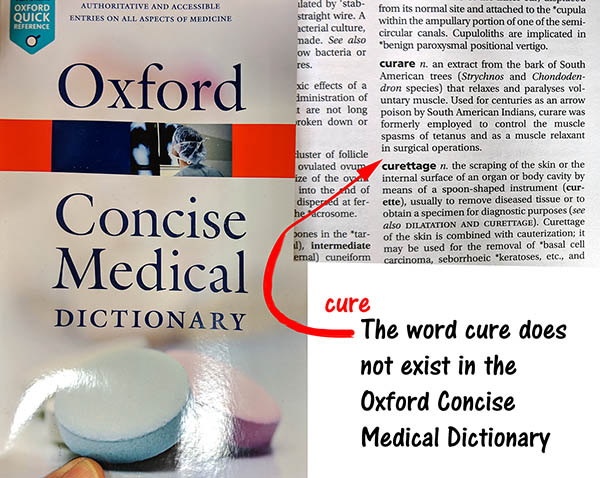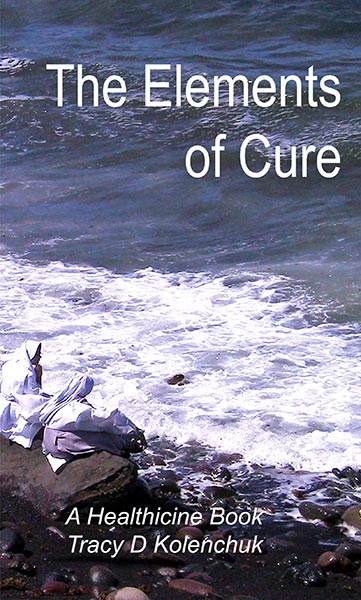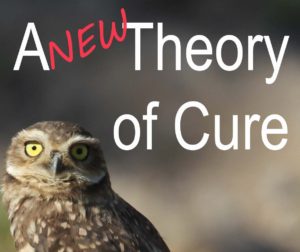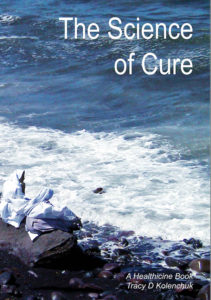The word cure does not exist in the 2015 edition of the Oxford Concise Medical Dictionary, as illustrated in this image: 
You can buy this edition at your local bookstore to verify this if you like. Or you can search the contents on Amazon to verify that “cure” is not found. How is it possible for a prestigious organization, with a world renown history of preparing dictionaries, to publish a medical dictionary that does not contain the word “cure” – and not notice the error years after it is published?
Truth be told, there is no medical definition of the word cure to be found anywhere. There are historical definitions of cure. Lots of them. They’re not consistent, nor comprehensive, nor scientific, nor medical.
Cure: not found Oxford Concise Medical Dictionary #cure Share on XThe prestigious medical reference texts: Merck Manual of Diagnosis and Therapy, 11th Edition, Harrison’s Principles of Internal Medicine, Lange’s Current Medical Diagnosis and Treatment, and the Diagnostic and Statistical Manual of Mental Disorders (DSM–5) do not contain a single definition of cure, much less a scientific medical definition.
Is this a new situation? No. The London Medical Dictionary, published in 1819, uses the word cure several times but does not provide a definition of cure. Many current medical dictionaries, including Webster’s New World Medical Dictionary, Third Edition, 2008, The Bantam Medical Dictionary, Sixth Edition, 2009. Medical Terminology for Dummies, Second Edition, The Oxford Dictionary of Nursing, Edition 6, 2014, do not contain a definition of the word cure. “Cure” does not appear in Barron’s Dictionary of Medical Terms, Sixth Edition, 2013, even though “incurable” is defined as “being such that a cure is impossible within the realm of known medical practice“.
The word cure is not defined medically. It’s official. If you think you are cured, you probably cannot prove it – cured being not defined medically either. Did you ever wonder, why every claim of a cure for arthritis, depression, diabetes, cancer, and many more diseases are considered quack cures? There are no real cures, there are only quack cures. No medical cures exist for these diseases, because medically, cured is not defined – not even in the dictionary.
Cured is defined for a few diseases, even though not in many dictionaries and reference texts. Cured is defined, and can be scientifically verified for a disease caused by an infection and cured with a medicine that kills the infecting agent, tested by proving that the infecting agent is no longer present. That’s it. There are no other tests for cured defined in the current practice of medicine.
Of course, cures are commonplace. I had a cold two weeks ago. It was cured by health. When I’m healthier, my colds are cured faster. When I’m not so healthy, it takes longer. But, according to medical references, there is no cure for the common cold. It’s nonsense. But it’s in the dictionary (by absence) and in the medical texts (by absence).
Why isn’t cure defined medically? The reason is trivial. Most cures come from health, not from medicines, not from alternative medicines. It is easy to define cure, cures, curing, and cured, but the definitions are embarrassing to conventional medicine. Most diseases cannot be cured by medicines.
The common cold, influenza, and measles cannot be cured with any medicine. No medicine can cure a chronic disease. No medicine can cure a mental disorder. No medicine can cure scurvy, or beriberi, or carbon monoxide poisoning. No medicine can cure any non-infectious disease. So, cured is not defined for these diseases. And as a result, Oxford’s Concise Medical Dictionary does not contain the word cure.
It’s trivial to define cured. We can begin with a few simple statements:
A case of disease is cured when:
- The cause and consequences have been successfully addressed.
- Signs and symptoms of the disease are no longer present.
- No more medicines are required.
Of course, the devil is in the details. But as long as cured is not in the dictionary, we will never be able to cure any disease, never be able to demonstrate that it has been cured. Anyone who claims to cure a disease will remain a huckster, a quack salesman, and their cures will continue to be viewed as quack cures. By the way, it’s OK to cure diseases – you just can’t claim to cure diseases, nor claim to have been cured of any non-infectious disease. Making a claim puts you up against the US/FDA laws, which clearly state that “only a drug can cure“.
 It’s time for a change. And the change is nigh. The newly published book:
It’s time for a change. And the change is nigh. The newly published book:
The Elements of Cure contains a comprehensive definition of cure. Many diseases are complex and compound. As diseases are not cured – the norm today, they acquire more and more elements.
It clearly documents the three elementary types of illness and their respective cures, making it possible to understand any disease as a set of curable illness elements and cure each of them in turn.
It’s time to put CURE into the medical dictionaries. It’s time to learn the meanings of cure, to test cures and improve them. It’s time to stop advising people to “learn to live with” their disease, which really means “learn to die with your disease“.
to your health, tracy
Founder: Healthicine


